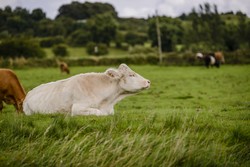Mining the genome of dairy cattle
The SEQSEL (Global cooperation to develop next generation whole genome sequence selection tools for novel traits) project has formalised research relationships between world-leading partners in Europe, Australia and New Zealand. Together, they have analysed the bovine genome to identify regions associated with feed intake and efficiency. Intense discussion and collaboration led to the conclusion that the most appropriate measure of feed efficiency for incorporating into breeding programmes appears to be country specific. Moreover, SEQSEL data has concluded that milk mid-infrared spectroscopy is the most suitable method to measure feed efficiency with an acceptable level of accuracy. The consortium pooled information regarding food intake (phenotype) and DNA. Altogether, more than 224 000 feed intake records from close to 7 000 cows and 1 800 growing heifers were collated and analysed. Significantly, the data originated from nine countries. This is by far the largest such database collated globally for feed intake in dairy animals. Results indicate that, on average, 34 % of the variation in feed intake is due to genetics and thus amenable to genetic selection. Moreover, an analysis to detect frequency of genotype-by-environment interactions between populations – the differences between animals differ depending on the environment – found that differences do exist especially between grazing and confined production systems. Sharing of DNA data and prediction of genotype showed that imputation was almost 97 % accurate. Financial implications of this are that a full DNA sequence of individual cattle costs approximately €22 compared with around €1 500 for conventional sequencing. Dissemination has been wide, both nationally and on a global scale. Several papers have been published in the peer-review Journal of Dairy Science and Genetics Selection Evolution. Partners have given presentations at prestigious international conferences including the 10th World Congress on Genetics Applied to Livestock Production. SEQSEL research results clearly show that collaboration and pooling large amounts of data have unprecedented benefit. With a growing population and a shrinking agricultural land area, this will address the issues of increasing global food demand and food security.







